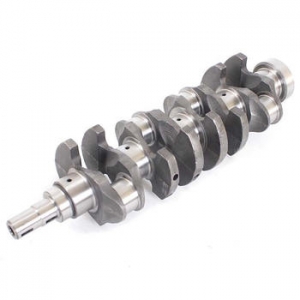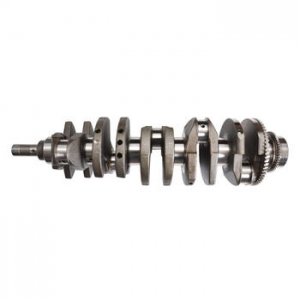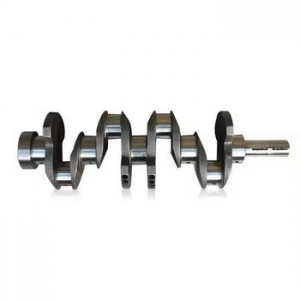Unlocking Power: The Essential Role of a Custom Industrial Crankshaft Manufacturer
In the intricate world of industrial machinery, every component plays a vital role, but few are as critical as the crankshaft. Often referred to as the "heartbeat" of an engine or compressor, it's the component responsible for converting the linear motion of pistons into rotational motion, driving everything from massive power generators to specialized marine engines. While standard, off-the-shelf crankshafts suffice for many applications, there comes a point where unique demands necessitate a bespoke solution. This is precisely where a custom industrial crankshaft manufacturer steps in, offering unparalleled expertise and precision to meet the most challenging specifications.
Frankly speaking, the decision to opt for a custom-made crankshaft isn't a trivial one. It's driven by specific performance requirements, unique operational environments, or the need to replace an obsolete part that no longer has a standard production line. To be honest, understanding the value a specialized manufacturer brings can mean the difference between a system that merely functions and one that truly excels, delivering optimal power and longevity.
The Unseen Heartbeat: Why Custom Crankshafts Matter
Have you ever wondered what makes a piece of heavy machinery operate flawlessly under extreme conditions? Often, it's the hidden, meticulously engineered components like the crankshaft. When standard designs fall short, a custom approach becomes not just an option, but a necessity.
Beyond Standard: When Off-the-Shelf Won't Do
Many industrial applications operate under conditions that are far from average. Think about the colossal engines powering ocean-going vessels, the robust compressors in a chemical plant, or the specialized equipment used in deep-earth mining. These environments often present unique challenges: extreme temperatures, corrosive atmospheres, immense loads, or highly specific space constraints. A standard crankshaft, designed for general use, simply won't cut it. It might lead to premature failure, inefficient operation, or even catastrophic breakdowns.
This is where the expertise of a custom industrial crankshaft manufacturer truly shines. They don't just produce parts; they engineer solutions. They consider every variable – from the specific torque requirements and RPM range to the unique vibration characteristics and expected lifespan. This deep dive into application specifics allows for the design and fabrication of crankshafts that are perfectly optimized for their intended purpose, ensuring maximum efficiency and reliability. For instance, a marine engine might require specific corrosion-resistant alloys, while a high-performance industrial pump could demand exceptional torsional rigidity and balancing.
The Engineering Imperative: Precision and Performance
The performance of any rotating machinery is intrinsically linked to the precision of its components. A crankshaft, being at the very core of this rotational motion, demands absolute accuracy. Even microscopic deviations in geometry, balance, or material composition can lead to excessive vibrations, premature wear, and significant power losses.
In my experience, the engineering imperative behind custom crankshafts is about pushing the boundaries of what’s possible. It involves sophisticated material science, advanced metallurgical processes, and incredibly tight manufacturing tolerances. A custom manufacturer employs cutting-edge design software (like CAD/CAM) and analytical tools (like Finite Element Analysis - FEA) to simulate real-world stresses and optimize the design before a single piece of metal is cut. This ensures that the final product not only fits perfectly but also performs flawlessly under its specific operational load, often exceeding the capabilities of mass-produced alternatives. It’s about building in resilience and performance from the ground up.

The Journey of a Custom Crankshaft: From Concept to Completion
The creation of a custom industrial crankshaft is a complex, multi-stage process that combines advanced engineering, skilled craftsmanship, and rigorous quality control. It's a testament to modern manufacturing capabilities.
Design and Engineering: The Blueprint for Power
The journey begins long before any metal is shaped. It starts with a detailed consultation between the client and the engineering team of the custom industrial crankshaft manufacturer. This initial phase involves understanding the exact application, performance goals, environmental conditions, and any specific constraints. Engineers then use this data to develop a precise blueprint. This includes selecting the optimal material, determining the ideal geometry (stroke, throw, journal diameters), and performing advanced simulations to predict performance under various load conditions. FEA, for example, helps identify potential stress points and allows for design modifications to enhance durability and reduce fatigue. This collaborative design process ensures that the final product is perfectly tailored to the client's needs.
Material Selection and Forging/Casting: Laying the Foundation
The choice of material is paramount. Custom crankshafts often require specialized alloys, such as high-strength steel, chrome-molybdenum steel, or even exotic materials for extreme applications. The manufacturing process then typically involves either forging or casting. Forging, which involves shaping the metal through hammering or pressing at high temperatures, is preferred for applications requiring maximum strength and fatigue resistance, as it refines the grain structure of the metal. Casting, while sometimes more cost-effective for complex shapes, is generally used for less demanding applications or for initial rough shaping before extensive machining. After the initial shaping, heat treatment processes are applied to further enhance the material's properties, such as hardness, toughness, and wear resistance.
Precision Machining: The Art of Shaping Metal
This is where raw material transforms into a high-precision component. Modern precision machined crankshafts are crafted using advanced CNC (Computer Numerical Control) machining centers. These machines can achieve incredibly tight tolerances, often measured in micrometers. Operations include turning, milling, grinding, and polishing. The crankshaft journals (the bearing surfaces) are ground to an exceptionally smooth finish to minimize friction and wear. Balancing is another critical step, involving the removal or addition of small amounts of material to ensure the crankshaft rotates without vibration, which is crucial for smooth operation and longevity of the entire engine system.
Quality Assurance and Testing: Ensuring Reliability
No custom crankshaft leaves the facility without undergoing rigorous testing. Quality assurance is integrated throughout the entire manufacturing process, not just at the end. This includes dimensional inspections using CMM (Coordinate Measuring Machine) to verify every critical measurement, non-destructive testing (NDT) such as magnetic particle inspection or ultrasonic testing to detect internal flaws, and surface finish analysis. For critical applications, fatigue testing might be performed to simulate years of operation and confirm the crankshaft's durability. This meticulous attention to quality ensures that each custom-made crankshaft meets or exceeds the specified performance and reliability standards, providing peace of mind to the end-user.
What to Look for in a Custom Industrial Crankshaft Manufacturer
Choosing the right partner for your custom crankshaft needs is a decision that impacts the performance and longevity of your machinery. It's worth noting that not all manufacturers are created equal.
Expertise and Experience: A Track Record of Success
When seeking a custom industrial crankshaft manufacturer, look for a company with a proven track record. Experience in diverse industries and with a wide range of engine types indicates a deep understanding of varying requirements. A manufacturer that has successfully tackled complex projects, perhaps even those involving obsolete parts or reverse engineering, demonstrates invaluable problem-solving capabilities. Many experts agree that a long history in the field often translates into refined processes, superior knowledge of materials, and a network of skilled technicians. Don't hesitate to ask for case studies or client testimonials to gauge their past successes.
Advanced Technology and Capabilities: The Tools of the Trade
The quality of a custom crankshaft is directly tied to the technology used in its production. A top-tier manufacturer will invest in state-of-the-art machinery, including multi-axis CNC machines, advanced grinding equipment, and sophisticated balancing systems. Beyond machinery, look for in-house capabilities for design (CAD/CAM), simulation (FEA), and comprehensive testing. Companies that perform most of these processes in-house often have better control over quality and lead times. The ability to handle large-scale components, complex geometries, and specialized material treatments is also a strong indicator of their advanced capabilities.
Collaborative Approach and Customer Focus: Your Partner in Innovation
A truly effective manufacturer acts as a partner, not just a vendor. They should be willing to engage in a collaborative design process, offering insights and suggestions based on their expertise. Clear communication, transparency throughout the manufacturing stages, and a proactive approach to problem-solving are hallmarks of a customer-focused company. I've found that manufacturers who prioritize understanding your specific challenges and who offer post-sales support or technical advice tend to build stronger, more reliable relationships. This partnership approach is particularly vital when dealing with unique or highly specialized requirements, such as those for bespoke engine crankshafts.
Applications and Industries: Where Custom Crankshafts Drive Innovation
The demand for custom industrial crankshafts spans a surprisingly wide array of sectors, each with its own unique set of challenges and performance requirements.
Heavy Machinery and Equipment
From massive excavators and bulldozers in construction to colossal mining trucks and drilling rigs, heavy machinery relies on robust engines that can withstand immense stress and continuous operation. Custom crankshafts ensure these powerful workhorses deliver consistent performance and durability in the harshest environments. This sector often requires heavy-duty crankshaft fabrication, focusing on maximum strength and wear resistance.
Power Generation
Diesel and gas generators, whether for prime power, standby, or grid support, depend on reliable crankshafts to convert fuel energy into electricity. Custom solutions are often needed for older generator sets, specialized fuel types, or for optimizing efficiency and reducing emissions in specific power plants.
Specialized Automotive and Motorsports
While not "industrial" in the traditional sense, high-performance racing engines, classic car restorations, and niche automotive applications frequently demand custom crankshafts. These are often designed for extreme RPMs, lightweight construction, or to fit unique engine configurations, pushing the boundaries of material science and precision machining.
Marine and Offshore
The marine environment is notoriously harsh. Ship engines, offshore drilling platforms, and specialized vessels require crankshafts that can withstand saltwater corrosion, constant vibration, and prolonged operation at high loads. Custom manufacturers provide solutions tailored for specific vessel types and operational profiles, ensuring reliability far out at sea.
Oil & Gas
Compressors and pumps used in the oil and gas industry, from extraction to refining, operate under high pressures and often with aggressive media. Custom crankshafts are essential for these critical pieces of equipment, ensuring efficient and safe operation in demanding and often remote locations.
The Future of Crankshaft Manufacturing: Innovation on the Horizon
The field of custom industrial crankshaft manufacturing is not static; it's continuously evolving, driven by advancements in materials science, digital technologies, and a growing demand for even greater efficiency and sustainability.
Advanced Materials and Manufacturing Processes
The future will undoubtedly see the integration of even more advanced materials, such as new high-strength alloys with superior fatigue resistance and lighter weight. Additive manufacturing (3D printing) for complex internal structures or even entire crankshafts, while still nascent for large-scale industrial components, holds promise for rapid prototyping and highly customized, optimized designs. New surface treatment technologies will also emerge, further enhancing wear resistance and reducing friction.
Digitalization and Industry 4.0
The adoption of Industry 4.0 principles will transform crankshaft manufacturing. Smart factories, equipped with interconnected machinery and real-time data analytics, will allow for predictive maintenance, optimized production schedules, and even more precise quality control. Digital twins – virtual replicas of physical crankshafts – will enable engineers to simulate performance and predict lifespan with unprecedented accuracy, leading to even more robust and reliable custom solutions. Interestingly enough, this level of digital integration will further solidify the role of the specialized custom industrial crankshaft manufacturer as a leader in advanced engineering.
In conclusion, the role of a custom industrial crankshaft manufacturer is indispensable in today's complex industrial landscape. They are the silent partners who ensure that the world's most critical machinery operates with unwavering power and reliability. From the initial design concept to the final, meticulously tested product, their expertise, advanced technology, and commitment to precision deliver the bespoke solutions that off-the-shelf components simply cannot. When performance, durability, and exact fit are non-negotiable, turning to a specialized manufacturer isn't just a choice; it's an investment in the future of your operations.
For more detailed information, please visit our official website:custom industrial crankshafts
About the author: Dr. Alistair Finch is a veteran mechanical engineer with over 25 years of experience specializing in heavy machinery design and component fabrication. His expertise spans advanced metallurgy, precision machining, and industrial power systems. Having consulted for numerous global manufacturers, Dr. Finch possesses a deep understanding of the critical role custom-engineered parts play in achieving peak operational efficiency and longevity across diverse industrial applications.
 Powering Giants: Unveiling the
Powering Giants: Unveiling the
 Unlocking Power: The Essential
Unlocking Power: The Essential
 Unlocking Power: A Deep Dive i
Unlocking Power: A Deep Dive i
 Forged vs. Billet Crankshafts:
Forged vs. Billet Crankshafts:
